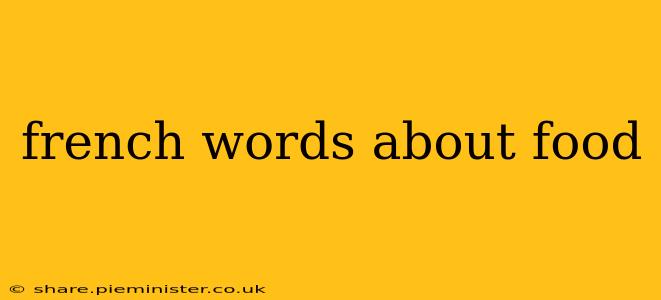A Delicious Dive into French Words About Food: From Appetizer to Amuse-bouche
France, the land of culinary excellence, boasts a rich vocabulary dedicated to food. This isn't just about basic words like "bread" (pain) and "cheese" (fromage); it's about the nuances, the subtleties, the sheer artistry of French gastronomy. This article explores a selection of captivating French food words, enriching your understanding of French culture and cuisine. We'll delve into some common terms, explore regional specialties, and even uncover some delightful surprises along the way.
What are some common French words related to food?
Let's start with the basics. Beyond "pain" and "fromage," consider these everyday food words:
- Le repas: This refers to a meal, encompassing the entire dining experience.
- Le déjeuner: This is lunch.
- Le dîner: This is dinner.
- Le petit déjeuner: This is breakfast. Note that the word "petit" (small) emphasizes the smaller scale of this meal compared to lunch or dinner.
- Le goûter: This charming word refers to an afternoon snack or tea break, a beloved tradition in France.
- La boulangerie: This is a bakery, the heart of many French towns and villages.
- La pâtisserie: This is a pastry shop, often found alongside boulangeries. It's where you'll find exquisite tarts, cakes, and macarons.
What are some more sophisticated French food terms?
French culinary vocabulary extends beyond simple sustenance. Here are some more sophisticated terms that reveal the depth and complexity of French cuisine:
- Amuse-bouche: This delightful little bite, served before the meal, is designed to stimulate the appetite. Think of it as a tiny, savory surprise.
- Mise en place: This crucial culinary term refers to the preparation stage, where all ingredients are measured, chopped, and organized before cooking begins. It's the foundation of efficient and elegant cooking.
- Gastronomie: This word encapsulates the art and science of good eating, encompassing the entire culinary culture of a region or nation.
- Le chef: The head chef, the culinary maestro orchestrating the kitchen's symphony.
- Le sommelier: This is the wine steward, expertly guiding diners through the wine list.
What are some regional French food terms?
France's culinary diversity extends to its regional variations. Here are a few examples:
- Cassoulet (Southwestern France): A hearty stew featuring beans, pork, and sausage.
- Crêpe (Brittany): Thin pancakes, often filled with sweet or savory ingredients.
- Boeuf Bourguignon (Burgundy): Beef stew braised in red wine, with mushrooms and pearl onions.
- Soupe au Pistou (Provence): A flavorful vegetable soup similar to pesto.
How can I learn more French food words?
Immersion is key! Exploring French recipes, watching French cooking shows (with subtitles if needed), and even visiting a French bakery or restaurant can significantly enhance your vocabulary. Consider using online resources like Duolingo or Memrise to learn vocabulary specifically related to food. You can also explore French cookbooks—the language itself will often be paired with mouth-watering pictures.
What are some fun facts about French food words?
Many French food words have fascinating histories and etymologies. For instance, the word "croissant" (crescent) refers to its shape, while "macaroon" derives from the Italian "maccarone," highlighting the cross-cultural influences on French cuisine.
By expanding your knowledge of French food vocabulary, you open a door to a deeper appreciation of French culture and the artistry of its cuisine. So, bon appétit, and happy exploring!
